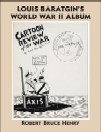
Louis Baratgin’s A Cartoon Review Of The War
Bruce Henry
Véhicule Press
$21.95
paper
142pp
978-1-55065-288-8
The best political cartoons distil a complex array of information into a single hard-hitting image, one whose message can be understood at a glance without being simplistic or sloganeering. By such a measure, Baratgin is a long way from the company of a master like Bill Mauldin. Is it fair to judge an obscure cartoonist who went largely unpublished in his lifetime against the best of his contemporaries?
Insofar as Baratgin was working within the accepted style of his time and presumably wanted his work to be seen by a wide audience, the answer is yes. Technically, Baratgin was a good enough draftsman, and like all cartoonists during World War II, he was helped along by the visual distinctiveness of his principal subjects. Hitler, Churchill, and Stalin were gifts to caricaturists and Baratgin gets plenty of mileage from portraying all three, though it has to be said he never quite got to grips with Mussolini. Where he begins to trip up is by making his panels too busy with both visuals and text, and over-explaining things on top of that. The cartoon on the cover, from 1941, can serve as an example. From a submarine labeled “Axis,”
Hitler points toward a distant planet Earth (we’ll leave aside the question of where exactly the submarine might be) and says to Mussolini “Dot’s vot I vont Benito!” Across Earth is written the helpful label “The World.”
That bit of Hitlerian speech is a pointer to where the real problems start. Baratgin’s representation of foreign accents (Mussolini: “I now maka
de war against da Engleesh to helpa my gooda frienda Adolfie”) causes uneasiness that even Robert Bruce Henry’s introductory disclaimer can’t
quite assuage, but is just about excusable in historical context. In places, though, satire crosses the line into inflammatory stereotyping and results in something so appalling that readers may want to throw the book across the room. A South Pacific Islander – an ally in Baratgin’s eyes – is drawn coal-black with a grass skirt and made to talk in a bizarre southern American accent. A pro-Canadian conscription cartoon from 1942 presents the Japanese as “Sly, Slinking Slant-Eyed Japs.” It’s one thing for cartooning to help mobilize a war effort; it’s quite another to employ the same hate-mongering that was used to justify the wartime internment of Japanese Canadians. At such times, this collection becomes less the proclaimed “remarkable portrait of a world at war” than a time-capsule reminder of changing social attitudes. It is indeed a fascinating historical document, just not the kind intended.
A footnote of accidental hilarity: in one 1942 panel, a guitar-strumming Mussolini is drawn crooning to the goddess of peace and her caged dove, who clearly aren’t enjoying what they hear. “Your music is punk!” says the dove. Move over, Ramones and Sex Pistols. Il Duce beat you to it by 35
years. mRb






0 Comments